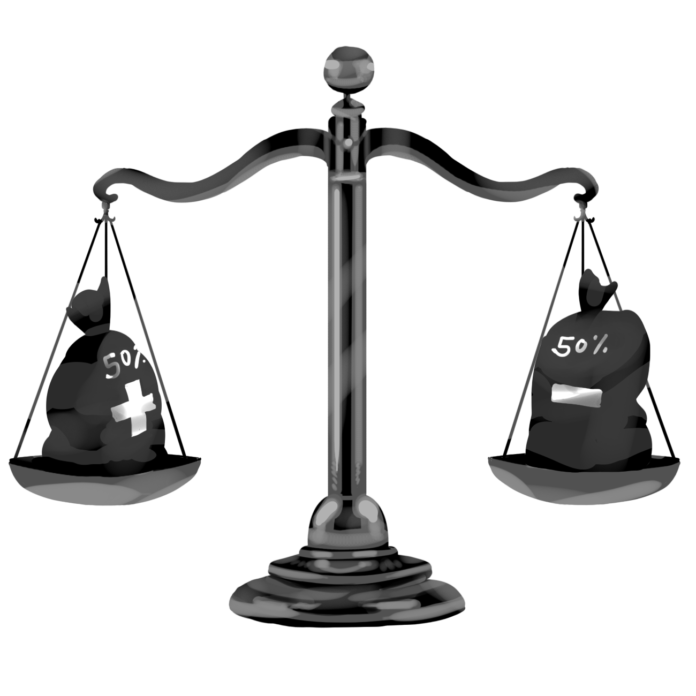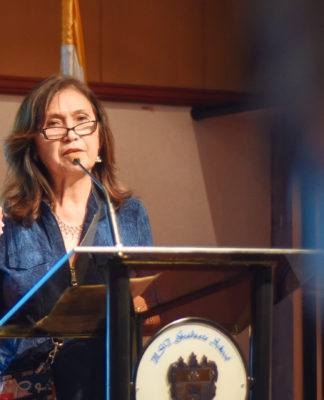ALMOST half of Thomasians are in favor of reviving capital punishment, a survey conducted by the Varsitarian showed.
The survey, conducted from October to December 2015, asked randomly selected respondents from all the faculties and colleges of the University if they were in favor of or against a number of proposals related to religion and morals, including the revival of the death penalty.
A total of 653 Thomasians or 48 percent voted in favor of capital punishment.
Thirty-nine percent or 529 respondents were not in favor, while 13 percent or 179 respondents had no answer.
This stance has the backing of three of five presidential candidates in favor of death penalty for heinous crimes and drug traffickers—Davao City Mayor Rodrigo Duterte and senators Grace Poe and Miriam Defensor Santiago.
‘Ironic result’
Dennis Coronacion, chairman of the the University’s political science department, said the “ironic” result of the survey showed that Thomasians had the ability to separate religious matters with socio-political issues. The Church is against the death penalty.
He said a perception of a “weak, indecisive and corrupt” government and a “yearning to see immediate results” influenced Thomasian opinion on the revival of death penalty in the Philippines.
“I think the youth perceive death penalty as the solution to the increasing crime rate in the country,” Coronacion said in an interview.
Coronacion said the Aquino administration had done well in terms of foreign policy, fighting corruption and stabilizing the economy, but failed to deal with crime.
Incidence of crime increased by 47 percent to 885,445 index and non-index crimes in 2015 from 603,085 in 2014, data from the Philippine National Police showed.
Index crimes are “serious in nature and occur with sufficient frequency,” and include murder, homicide and rape.
Capital punishment was practiced during the Spanish regime up to the Marcos dictatorship. It was abolished during President Corazon Aquino’s term. President Fidel Ramos revived death sentences, with the crime rate up in the latter part of the Corazon Aquino administration.
In 2006, death penalty was put to an end by President Gloria Macapagal-Arroyo upon the request of the European Union and the Vatican.
Article III, Section 1 of the 1987 Constitution states that “no person shall be deprived of life, liberty or property without due process of law.”
“The Filipinos’ right to enjoy life is not only repeated in the Constitution but also strengthened by other pro-life and pro-human rights provisions,” Civil Law Dean Nilo Divina said in an email to the Varsitarian.
The Constitution also provides that there should be a higher concern for man more than property, for people more than the state, and for life more that mere existence, he said.
Divina said error in human judgment and biases preclude the revival of death penalty in the country. “Just like in other legal systems, retributive capital justice is tainted by bias and influence of factors beyond the control of courts of justice,” he added.
Lawyer Raymond Fortun said executive philosophy and morality must be considered by the government should death penalty be revived in the Philippines.
“The chief executive must have the firmness to implement capital punishment notwithstanding pressures from within and without,” Fortun said in an email.
Fortun added that the penalizing branch of the government must also decide whether the punishments in the country are meant to reform or discipline offenders.
Lawyer Kenneth Radaza, a graduate of the Arellano University Law specializing in civil and commercial disputes and criminal cases, said death penalty was a “divisive and polarizing issue” given Filipinos’ religious beliefs.
“There will be a firestorm of debate if capital punishment is introduced by way of legislation at this time,” Radaza said in an email, adding that the purpose of the penal law to rehabilitate and reform criminals will not be met if they are “killed right away.”
Death penalty ‘militates against the powerless’
Capital punishment is often defined “not only by the nature of the crime but also by [the defendant’s] social background,” Divina pointed out.
The death penalty, he added, could impede investigations and preparations needed to prosecute criminal cases.
“[Death penalty] militates against those who cannot afford the legal services necessary in capital crimes, where extensive preparation, investigation, research and presentation are required,” Divina said.
A 2004 survey conducted by the Free Legal Assistance Group, a nationwide organization of human rights lawyers, found that “the profile of death row is the profile of the poor in Philippine society: largely uneducated, largely unemployed and generally living in poverty.”
The 1,121 respondents represented 87 percent of the total death-row population in the country. Only 890 capital offenders answered the survey.
“More than half (52 percent) of the inmates belong to the lowest socioeconomic classes of Philippine society, as seen by their poor education, poor occupational status, low wages, lack of access to sanitation and water, and lack of ownership of appliances and vehicles,” the survey stated.
Almost 40 percent of the respondents failed to complete elementary education.
Survey results showed that 82 percent of the inmates worked in sales, services, factories, agriculture, transport and construction—occupations associated with the lower socioeconomic class.
Also, 706 respondents or 79 percent said they were not shown warrants upon their arrest, while 117 said otherwise; 697 or 78 percent claimed their constitutional rights were not relayed at the time they were apprehended.
Sociologist Josephine Placido said the Public Attorney’s Office (PAO) “somehow lightened” the burden of lower-class defendants through Republic Act 9406—PAO’s enabling law granting special allowances to officials and lawyers under the government law office.
“Solving cases take a long time because most of the prisoners do not have lawyers,” Placido said in an interview.
PAO’s mandate is to provide free legal services to the poor.
















Thomasian ako… Wala namang pinasagutan sakin…